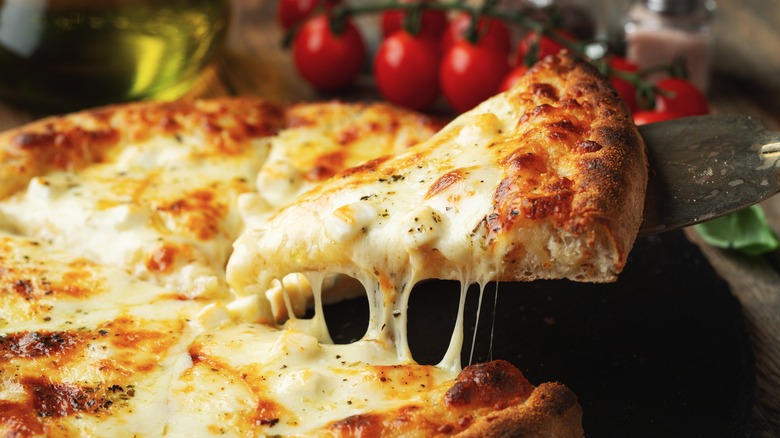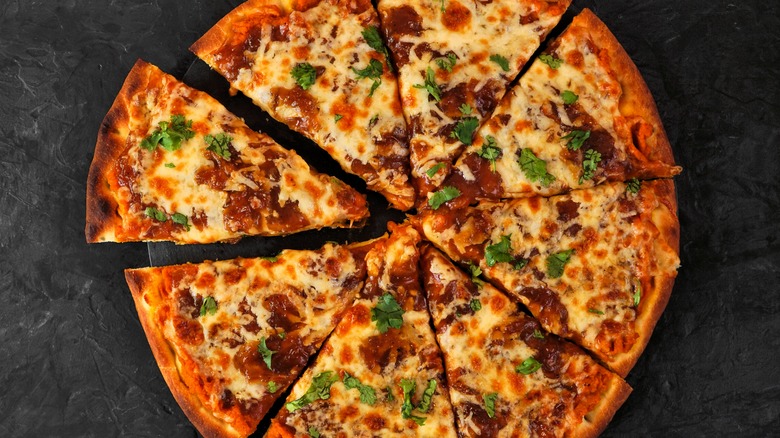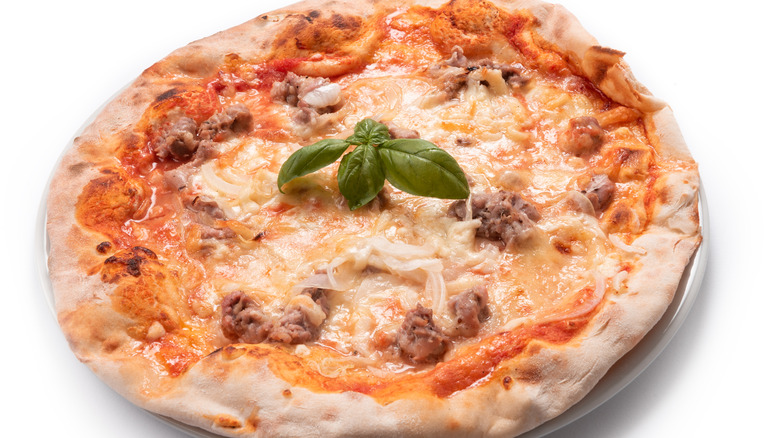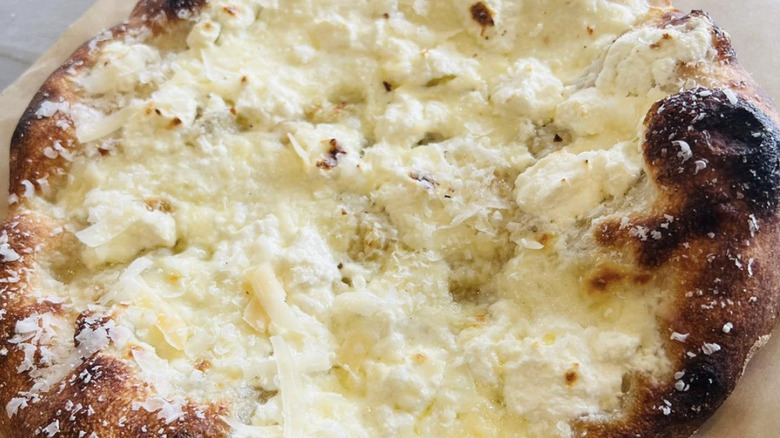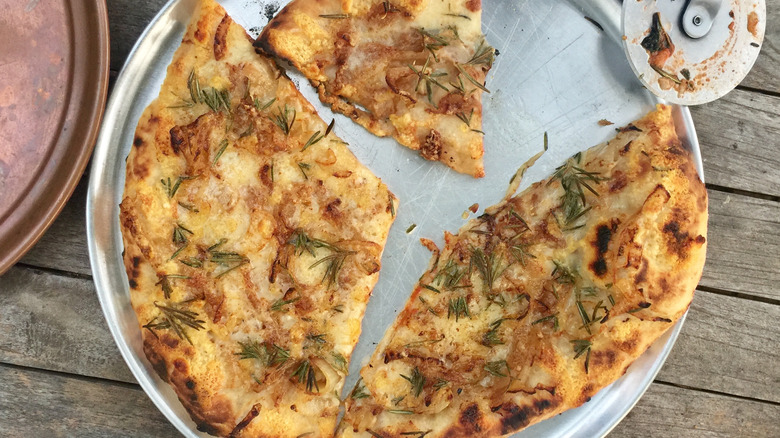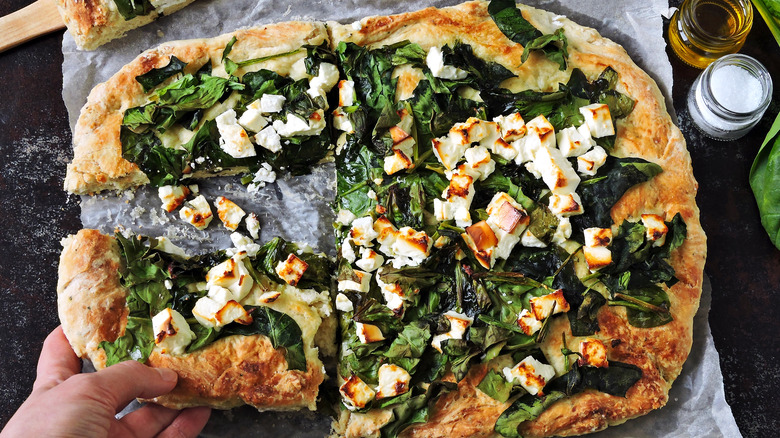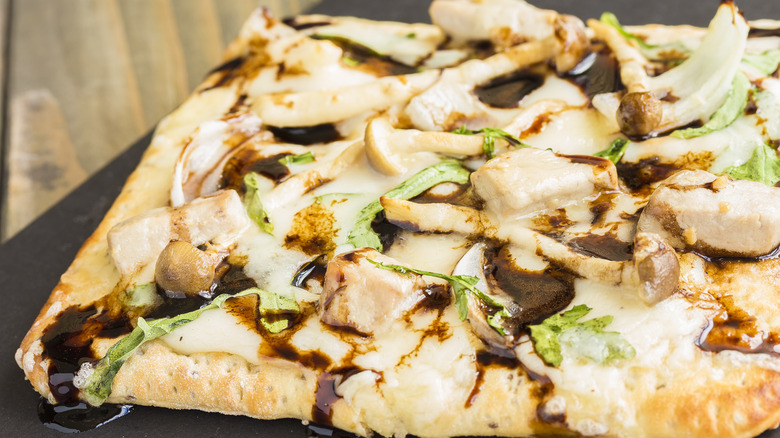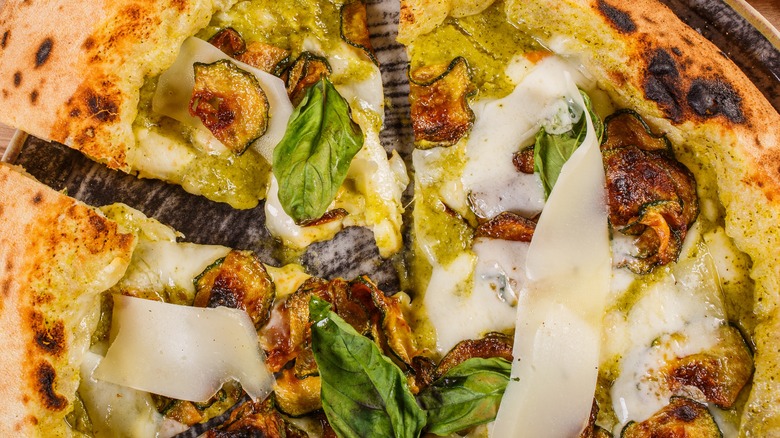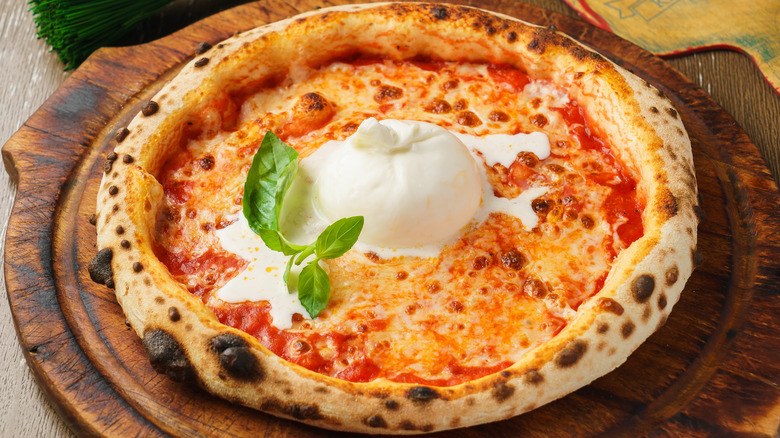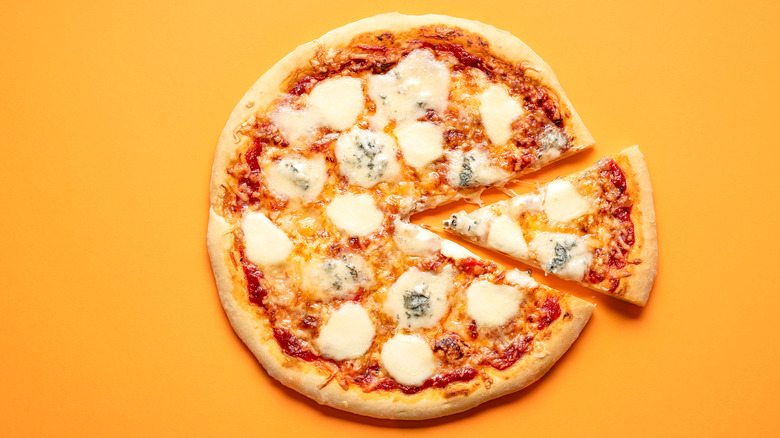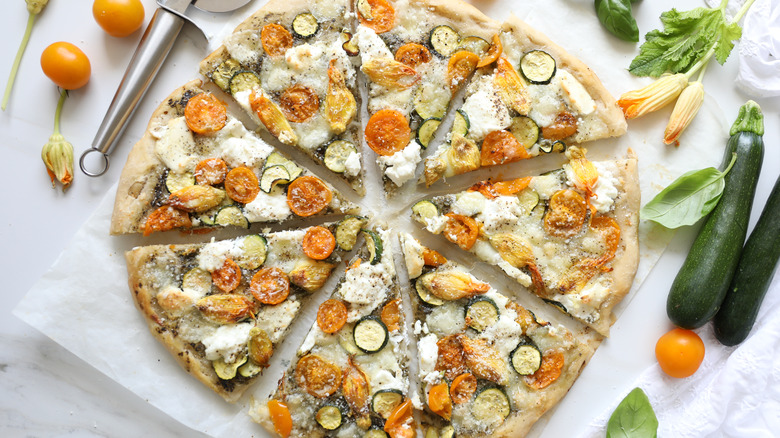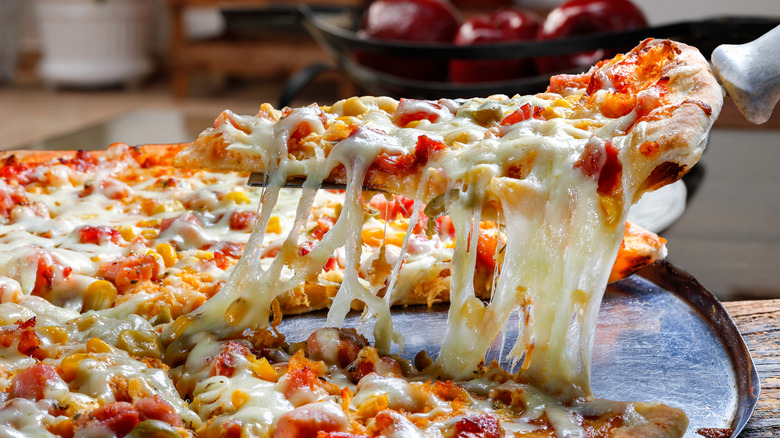The Best Cheeses For Pizza, Ranked
We may receive a commission on purchases made from links.
Whether it's movie night, moving day, a late-night craving, or a quick meal, pizza is a regular part of most of our lives, and for very good reasons. It's cheap, filling, and almost always available on short notice, making it the perfect go-to bite when you just don't feel like cooking. It's easy to bake a pizza yourself, too, opening up a nearly infinite world of personalization from shape and size to doughs, sauces, and toppings galore.
And then there's cheese. The ooey-gooey, stretchy cheesiness of pizza is what visually attracts so many of us to this simple food, but not all cheese is equally suitable for topping pies. From moisture content to melting capability, it's important to choose the right cheese when making pizza at home, and there's a wide world to choose from. Even if you play it safe and stick with traditional mozzarella, we feel it's only fair to inform you that not all mozz is the same, so be sure you don't use the wrong mozzarella for homemade pizza. For the more culinarily curious among you, we've ranked the best cheeses for pizza to spice up your homemade pie nights, and here they are from good to amazing. But first, one little pro-tip before we begin: While there's plenty of debate on whether pineapple belongs on pizza, science says nobody puts cheddar on pizza because it just doesn't work, so don't look for it on this list. It's not here.
11. Gouda
There are plenty of reasons to eat Gouda, one of the most popular Dutch cheeses worldwide, but you may be raising an eyebrow or two over the idea of adding it to your pizza. We hear you, but we beg you to give it a try. Wisconsin Cheese describes Gouda's flavor profile as similar to the familiar nutty notes of parm cheeses with a hint of buttery caramel reminiscent of butterscotch, so consider it a slightly sweeter take on Parmesan and you may come to understand why it's worth considering for your next pizza.
Speaking from personal experience, Redditor 457undead claims that adding some quality smoked Gouda to your pie is an easy glow-up for even the cheapest premade pizzas, and other Redditors have enjoyed adding Gouda to their homemade pizzas, too. Redditor LuluTopSionMid posted a tempting photo of melted Gouda with pickled vegetables on a homemade pizza, but Redditor bigwigmike recommends shredding aged Gouda as a finish for homemade pizza. In other words, he argues that it's better as a seasoning than a topping, like parm cheese, and we agree. Because of its more limited utility and potentially alienating flavor profile, it ranks last on our list of the best cheeses for pizza, but it's still on the list, so don't sleep on it.
10. Pecorino-Romano
While the grated cheese found in plastic jars across American supermarkets doesn't have a great reputation, we know plenty of you are using them (and so do we, in a pinch), so you may already be familiar with Pecorino-Romano because it occasionally appears in these convenient shakers. In fact, as registered user Trianon explains in a Pecorino thread on Pizza Making, Pecorino-Romano is often used as a cheap substitute for Parmigiano-Reggiano. Does that mean you should completely disregard it? Definitely not. Even if you agree it's just a cheaper substitute for the parm cheeses, that only means it should sit right below them on any solid ranking of the best cheeses for pizza, like this one.
When you do go this route, do stay away from the shaker if at all possible. Rather than cheap out on the shaker varieties, follow the advice of Redditor Apizzaface and invest in a chunk of imported Pecorino-Romano that you can freshly shave onto your pizza when it's time to bake. Apizzaface prefers adding it before baking, but we suggest shaving it on after as a finishing touch rather than a baked topping since it's not a particularly great melting cheese anyway.
9. Parmigiano-Reggiano (Parmesan)
Parmigiano-Reggiano and Parmesan are absolutely not the same product but they are, essentially, the same cheese. As Garlic Delight describes, the difference here is nearly the same as the difference between Champagne and sparkling wine. That is to say, Parmigiano-Reggiano must come from a designated region in Italy. There are a couple of other nuances necessary for Parmigiano-Reggiano, but Parmesan doesn't need to meet any of these requirements, making it cheaper and more ubiquitous. For the purposes of this list, they are about the same on a pizza so we'll address them together and refer to them collectively as parm. While sprinkling parm all over every dish is one of the common mistakes everyone makes at Italian restaurants, it's not necessarily a problem for pizza.
As Piaci Pizza notes, you won't find Italians in Italy sprinkling pre-grated parm all over their pizzas because they only use freshly grated cheese and rarely on pizza at all. Still, it's common in the United States and, as Quora user Ulysses Elias describes, it has a very strong flavor and a distinctly granular texture that likely contribute to its wide fan base. Be warned, though: It shouldn't be used as a substitute for mozzarella because the flavor would be overwhelming at such volumes and it wouldn't melt evenly, as explained by Cooks Dream. Instead, they suggest mixing some grated parm with mozzarella to cover your pie or simply using some after baking on a finished pizza.
8. Gruyere
For the Swiss cheese lovers who may be feeling a bit left out by our ranking of the best cheeses for pizza, your moment has arrived. The only Swiss on our list, Gruyere cheese may be better known as a great cheese for homemade mac & cheese or for a grown-up grilled cheese sandwich, but it's a solid choice for pizza, too. Flavor aside, this is largely because of how well it melts during cooking (especially younger Gruyere, per MasterClass), which is exactly what both of those former dishes require, too. Additionally, Top Cooking Stories reports that Gruyere also doesn't blister easily under the heat of the oven, so you'll have an easier time avoiding burn spots if you're prone to ignoring your timer and overcooking your pie.
If you're hosting friends for pizza night and really want to impress them with your Gruyere usage, step up your game with a classy pizza like a Savoyarde-style pie. While Gruyere is actually from Switzerland (it's a Swiss cheese, after all) and Savoyarde refers to a style of preparation from the French Alps. Redditor hermesbb claims that Gruyere works fine for a delicious take on a pizza Savoyarde, and we see no reason it shouldn't.
7. Goat Cheese
Switching gears entirely, The Sauce describes goat cheese as tart and tangy and highly recommends it as one of the best cheeses for pizza. They do caution, however, that it doesn't pair well with some of the more common pizza toppings like pepperoni, but there are plenty of other ingredients that complement goat cheese beautifully. While The Sauce references feta as an easily accessible goat cheese, we'd like to point out that not all feta is actually goat cheese, as Président says, so shop carefully if feta is your preference.
Redditor LeanSalinas is proof that not everyone loves goat cheese on pizza, but concedes that there's nothing to dislike about it, either. Sure, this isn't the highest possible praise, but take note that goat cheese only ranks toward the middle of our list of the best cheeses for pizza, and that's partly due to the lukewarm reception it may receive from some. Personally, we side with Redditor waynedewho, who replies that goat cheese is exceptional with caramelized onions and balsamic glaze on a pizza, reminding us all that goat cheese truly does require the proper partner ingredients in order to shine on a pie. But we're big fans of teamwork, so we don't find any fault with goat cheese here.
6. Havarti
While several of the cheeses on this list aren't ideal as standalone pizza cheeses and are best when mixed with mozzarella like provolone, above, Havarti needs no such companionship. As D Lakin explains on Alexa Answers, this Danish cheese has a similarly semi-soft texture and shredding ability to mozzarella and makes a great substitute when you're looking for a change. Redditor mortedarthur adds that Havarti is a bit saltier than mozzarella, so keep this in mind if your health needs or flavor preferences would be swayed by salt content, and choose accordingly.
Despite the increased sodium content, American Restaurant describes Havarti as delivering a hint of sweetness that's less detectable in mozzarella and some other popular pizza cheeses, adding a unique note worth exploring. They recommend using Havarti when you want an extra cheesy flavor from your pizza, and we agree that it's a simple substitution that does bring more of a cheese flavor than mozzarella without adding any of the funk or excess tang that may turn off some of the less cheese-curious. If you're baking for a crowd and want to do something different but aren't entirely sure of everyone's preferences, Havarti is a safe bet for success.
5. Provolone
Prepare to read this a few more times before our ranking of the best cheeses for pizza is complete: This cheese doesn't have the stringy texture mozzarella offers, which means it's not an ideal substitute for your pizza but makes a great partner in combination with mozzarella, as confirmed by Countertop Pizza Oven. Lest you think that would indicate that provolone isn't worth your time on pizza night, consider that popular pizza delivery company Domino's uses provolone on every one of its specialty pizza varieties, so you may already be accustomed to it. If you're a Domino's fan, you may find yourself seriously disappointed if you fail to use provolone during your homemade pizza night, and now you know why.
Of course, your tastes may vary from ours. Though we wouldn't recommend it ourselves, Redditor pplforfun finds provolone to be superior to mozzarella and implies that it's a worthy substitution altogether. In response to this claim, Redditor JohnKellyDraws notes Midwest pizza chain Pizza King includes provolone in its pies, but he takes a more centrist approach by suggesting a blend rather than total substitution. You know where we stand in this debate, but if you're going to try the pure provolone method, we recommend using a few whole, thin slices of the cheese strategically placed around the pie rather than trying to tear it into awkward pieces.
4. Burrata
As Vinepair explains, burrata is essentially a type of mozzarella cheese. More accurately, it's a ball of mozzarella scraps (specifically curds, mixed with cream) encased in a thin mozzarella skin to hold its shape. When broken open, burrata spreads tantalizingly across whatever is below it, adding its cheesy flavor to each bite.
Burrata is a newer cheese, created in the 1920s, but its rise in popularity as a pizza topping is even more recent. If you've noticed burrata pizzas popping up at restaurants or house parties more often, you may have a viral TikTok from @_lacebakes_ to thank. Showing the creamy ball of bliss plopped atop the center of a small pie before releasing its inner goodness, this video catapulted burrata to social media stardom in the summer of 2022 and has amassed more than 28 million views as of January 2023. Pizza Today explains that burrata's mild flavor helps it adapt to just about any toppings you want to include in your pizza, from sweet to spicy, and it takes just one centrally placed ball of burrata to complete your pie. If you'll be sharing with fussbudgets who might argue over who has more burrata, you can also precut the ball and add a bit of shell and filling to each slice to ensure a more equitable distribution.
3. Gorgonzola
We know we're close to losing a few of you on this one — we're looking at you, blue cheese haters — but stick with us. Gorgonzola is scrumptious on pizza. Per Wisconsin Cheese, Gorgonzola is a type of blue cheese that is specifically made from cow milk, which is not necessarily true of all blue cheeses, and Spizzico Italian Kitchen confirms it's milder than most blue cheeses, making it a bit more approachable to the category's naysayers.
Thanks to the milder flavor, Pizza Today hails Gorgonzola as one of the most adaptable and versatile of the blue cheeses and recommends looking for a Gorgonzola naturale to pair with classic pizza ingredients like dough and tomato instead of a sweeter Gorgonzola dolce, which might not stand up to your other ingredients. If you do prefer to go the sweeter route, stick to the theme and opt for a sweeter pizza, like one with caramelized onions or pear, rather than a heartier pizza or even a classic tomato pie. Despite its milder profile, you still won't need much Gorgonzola to pick up on its fabulous flavor, so this is a good candidate for blending with other cheeses or using as a finisher after baking, as you might use dried oregano. If this sounds as fabulous to you as it does to us, there are a few other underrated cheeses you should know about to add similar funk to your pizza.
2. Ricotta
Technically, ricotta isn't considered an actual cheese, but most of us aren't food scientists so we're willing to let that one go. Still, if you've just become a bit more curious about this cheese masquerader, there's probably more you didn't know about ricotta so feel free to take five for a research break and come back after. Ricotta is creamy and often used in baked pasta dishes, so it logically follows that it would pair well with traditional pizza flavors, too. And it really does.
When one Redditor complained that they never find ricotta and tomato sauce on pizza, an employee of Blaze Pizza hopped into the thread and confirmed the chain does make pizzas that include ricotta on top of red sauce, and that they're delicious (especially with a drizzle of barbecue sauce). It's important to note, as Well Plated explains, that ricotta is not shreddable and will not spread evenly across the entire pie while baking. Instead, ricotta holds its shape under heat while slightly expanding into gooey little pools wherever it's dolloped atop the dough and other toppings. This creamy cheese with an approachable taste and an enjoyable texture is our top choice for a winning white pizza and our second favorite pizza cheese overall.
1. Mozzarella
Yes, we're here to explore some fun alternatives, but it would be absolutely absurd of us to pretend that any cheese other than mozzarella is the number one cheese for pizza. As Milky Mist exclaims, mozzarella isn't just the best cheese for pizza, it's the Queen of Mediterranean cuisine thanks to its mild flavor, middle-of-the-road firmness, and adaptable texture. The entirety of Mediterranean cuisine aside, let's focus on exactly why it's so ideal for pizza.
Milky Mist reports that mozzarella's flavor profile is particularly amenable to blending with classic tomato pizza's other main ingredients and that the melty pull of cooked mozzarella is especially appealing to the eye, but it's the baking performance that really sets it apart. Mozzarella bakes to a gooey, bubbly, golden finish in the same time that it takes pizza to bake, and we all love that combination of convenience and quality. Still, be careful to seek out the right mozzarella for homemade pizza baking, which The Pizza Heaven says is low-moisture mozzarella that will perform best in American home ovens. It shreds more easily and prevents soggy dough, making the homemade prep process painless even if you overdo it with your cheese proportions. Bonus: It's cheaper than fresh mozzarella, too.
